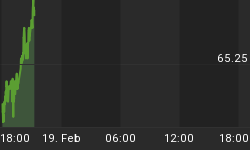Something happened in April that crippled the US economy. First it was the reports from four regional Fed manufacturing surveys showing a sharp slowdown in growth. Then weekly jobless claims began printing four handles each week with today's 474,000 on top of last week's 429,000. The real kicker was Wednesday's ISM Services that registered a very sharp drop off and now sits precariously close to contraction.
I was going to show you a chart of CPI which has clearly spiked and claim that was the cause.

And then I came across this chart of national gas prices and there was the answer. Well at least part of it (couldn't find a chart of average grocery bills). Look at the spike through March and April.

QE was intended to lower long term rates and inspire American's to spend more. The Fed certainly inspired us to spend more but failed to inspire real wage growth. We now spend more on groceries (food at home) and gasoline resulting in less for discretionary purchases.
In the December 60 Minutes interview Bernanke claimed he could adjust rates in "15 minutes." That may very well be true but once inflation hits the pipeline it takes far longer to control. It took some time for inflation to really hit the economy but now that it's here even if prices fell tomorrow we still have a lot of inventory that was built at those higher prices.
Now we have an interesting game on our hands. Let's assume the recent massacre of commodity prices continues, can the consumer handle the UFC style body blows until the ref steps in and stops the fight? How much inflation is in the system that needs to be worked off? Today saw a drop in productivity meaning margins are getting squeezed even further. That means more layoffs. As demand for discretionary purchases falls further that means even more layoffs.
As more consumers lose their jobs, demand falls even further. What if inflation is not "transitory?" What if commodity prices begin moving higher and inflation takes a second leg higher? The problems will only grow. Demand will only fall faster.
During the recent FOMC press conference Bernanke when asked about future QE said, "tradeoffs for QE3 are less attractive." Group think says that QE3 will begin after a brief pause in June. That is quite possible but in fact the tradeoffs have changed.
QE drives inflation which has killed demand. As the Fed tries to inflate the economy all it is really doing is deflating demand.
















